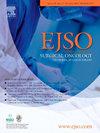Impact of socioeconomic determinants of health on delays to care in gastric cancer: A national cancer database analysis
IF 3.5
2区 医学
Q2 ONCOLOGY
引用次数: 0
Abstract
Introduction
The impact of demographic and socioeconomic backgrounds on delays to cancer care and subsequent mortality for those with resectable gastric adenocarcinoma is not well studied. We sought to investigate the relationship between sociodemographic determinants of health, delays to consensus guideline therapy, and survival outcomes for gastric cancer.
Methods
Patients with gastric cancer from the National Cancer Database (2004–2020) were partitioned into early-stage (AJCC Stage 0-I) and locoregionally advanced (Stage II-resectable stage IV) disease receiving upfront surgery and neoadjuvant therapy (NAT) followed by surgical resection, respectively. The primary outcome was odds of delay to upfront surgery or NAT initiation/post-NAT resection. Secondary outcomes were short-term (30-, 90-day) mortality and long-term survival.
Results
A total of 18,307 patients were identified; 10,623 and 7684 patients had early-stage and locoregionally advanced disease, respectively. The median [interquartile range] time to upfront surgery: 42 [22–66] days, NAT initiation: 40 [29–54] days, and post-NAT resection: 55 [44–69] days from end of NAT. In adjusted analysis, African American race, Medicaid or non-Medicare governmental insurance coverage, and lower educational and/or income status were significantly associated with delayed initiation of preoperative therapies. Delayed upfront surgery was associated with worse long-term survival (HR 1.15 [1.05–1.23], p < 0.001); delayed post-NAT surgery but not delayed NAT initiation portended worse 90-day mortality (HR 1.31 [1.02–1.69], p = 0.038) and long-term survival (HR 1.21 [1.10–1.32], p < 0.001).
Conclusion
Demographic and socioeconomic characteristics are associated with delays in receiving consensus guideline therapy for gastric cancer and translate to significantly worse survival outcomes.
社会经济因素对胃癌延迟治疗的影响:一项国家癌症数据库分析
人口统计学和社会经济背景对可切除胃腺癌患者延迟接受癌症治疗和随后死亡率的影响尚未得到很好的研究。我们试图调查影响健康的社会人口学因素、指导治疗共识的延迟和胃癌生存结局之间的关系。方法将来自美国国家癌症数据库(2004-2020)的胃癌患者分为早期(AJCC 0-I期)和局部晚期(ii期-可切除的IV期),分别接受术前手术和新辅助治疗(NAT),然后手术切除。主要结局是延迟术前手术或NAT起始/ NAT后切除的几率。次要结局是短期(30天、90天)死亡率和长期生存率。结果共检出18307例患者;10623例为早期疾病,7684例为局部晚期疾病。术前手术的中位数[四分位数范围]时间为42[22-66]天,NAT起始时间为40[29-54]天,NAT术后切除时间为55[44-69]天。在调整分析中,非裔美国人种族、医疗补助或非医疗保险政府保险覆盖率、较低的教育程度和/或收入状况与延迟开始术前治疗显著相关。延迟术前手术与较差的长期生存相关(HR 1.15 [1.05-1.23], p <;0.001);延迟NAT后手术但不延迟NAT起始预示着更差的90天死亡率(HR 1.31 [1.02-1.69], p = 0.038)和长期生存(HR 1.21 [1.10-1.32], p <;0.001)。结论:人口统计学和社会经济特征与胃癌患者接受共识指导治疗的延迟相关,并转化为显著较差的生存结果。
本文章由计算机程序翻译,如有差异,请以英文原文为准。
求助全文
约1分钟内获得全文
求助全文
来源期刊

Ejso
医学-外科
CiteScore
6.40
自引率
2.60%
发文量
1148
审稿时长
41 days
期刊介绍:
JSO - European Journal of Surgical Oncology ("the Journal of Cancer Surgery") is the Official Journal of the European Society of Surgical Oncology and BASO ~ the Association for Cancer Surgery.
The EJSO aims to advance surgical oncology research and practice through the publication of original research articles, review articles, editorials, debates and correspondence.
 求助内容:
求助内容: 应助结果提醒方式:
应助结果提醒方式:


